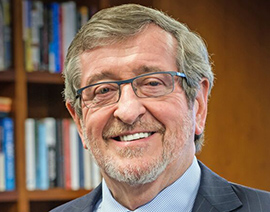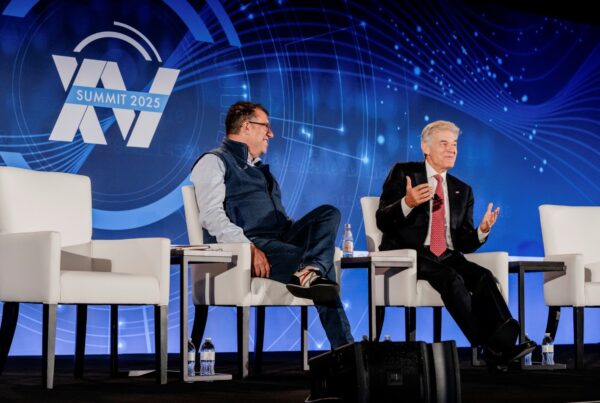Michael Dowling has served as the chief executive of Northwell Health since 2002. During those two decades he has been named to numerous top CEO lists, both in health care and industry in general.
 Today, Dowling is encouraging fellow CEOs to broaden the impact they make to advance a range of societal issues, from climate change to gun violence and health equity — all while rethinking how to fashion their organizations, and the industry at large, to become more innovative and resilient in what he described as the “new beginning” COVID-19 has created.
Today, Dowling is encouraging fellow CEOs to broaden the impact they make to advance a range of societal issues, from climate change to gun violence and health equity — all while rethinking how to fashion their organizations, and the industry at large, to become more innovative and resilient in what he described as the “new beginning” COVID-19 has created.
Health Evolution Editor-in-Chief Tom Sullivan spoke with Dowling about how the COVID-19 pandemic has changed him as a leader, why Northwell is hosting an event for innovators, rethinking how to fashion the organization and influence the broader community, reasons he is optimistic about the future and more.
How has the pandemic changed you as a leader? And how does it shape the way you think about the future?
Dowling: It gives you a new perspective about the responsibility you have as the leader of a large organization. It’s no longer just about managing the organization internally. CEOs have to take an influential role more broadly in the community to work on issues such as gun violence, inequities in communities of color, building trust in science again, fighting the toxic nature of our politics and helping people become more civil in the public discourse. COVID demonstrated how valuable health care is and the public realized we are the central safety net. Now, we as CEOs and leaders have to raise the bar. I’m more motivated than ever about the responsibility to do more. That’s why I’m urging CEOs and others in influential positions to think of themselves as community-wide leaders, not just corporate CEOs, and to work on issues about the environment and building a sense of community again. People really came together during COVID in dramatic ways. The number of companies that provided support to us during the pandemic demonstrated enormous creativity and innovation. We did things we never thought we could do. It also gave me a different perspective about family, and relationships. We saw death like we have never seen it in our careers. There’s always potential for people to be short-sighted and forget so we have to fight not to forget what we learned. How do we maintain and enhance that innovation spirit post-COVID?
To that end, Northwell is hosting the fourth Constellation Forum this week. It’s at least somewhat novel for a health system to host an innovation event. What is the inspiration fueling it?
Dowling: Let me go back to the beginning. I attend many meetings and I have been doing so for years and I realized that none of the thought meetings, the meetings that bring together people from different fields to discuss various topics such as innovation, most of those are someplace else. Chicago. Dallas. Atlanta. San Francisco. I realized there are no meetings like that in New York. So the idea was to host meetings in New York for interesting people from disparate fields to share concepts and entrepreneurship ideas. We decided to hold it in August and some people said no one would come to New York in August, but when we did the first event 700 or 800 people showed up. They came from all over, even tech types from Silicon Valley. It became a real draw and we got some of the biggest names in the country. Based on that success, we decided to host it on an annual basis to share ideas and various perspectives from different businesses. Typically, the night before the event I host a dinner in New York City so it’s also about networking and relationship building. People are asking for it so we committed to do it every year. And it demonstrates the attractiveness of New York. People want to come here. It’s a great city, we should be proud of it. We will move forward and emerge stronger because we went through COVID.
In New York and elsewhere, in order to keep that innovation spirit you mentioned alive and become a stronger, more resilient health care system, what are your top priorities emerging post-pandemic?
Dowling: I’ll give you three areas. One, and we were pretty well prepared compared to other systems, but it’s making sure our emergency management capability is more robust for the future. The second is expanding more into digital health care to leverage the consumer connection with providers using technology. We have always looked at information technology but now we’re moving into virtual care and much more of our business will be virtual. We put a big task force together, which just came out with a big internal report on this. Third is managing the new workforce. We have to expand and enhance efforts to take care the physical and emotional needs of the staff more than we ever did before to enhance employee engagement and satisfaction based on our learnings from COVID.
You’ve also been a proponent of funding for anti-gun violence programs and established the Center for Gun Violence Prevention and the Gun Violence Learning Collaborative. What progress has Northwell made with those initiatives to date?
Dowling: From the time I took out a full-page ad in The New York Times two years ago and started traveling around talking to hospital CEOs to persuade them that gun violence is a public health issue — at the time I received very few positive responses — we have since collaborated with some of the largest health systems, partnered with most of the largest organizations on education and prevention programs, won an NIH grant to pre-screen patients on the issues of guns and safety and that has been replicated or talked about being replicated in many organizations around the country. I’ve witnessed an amazing change of attitude and collaboration among partners. We are not the only reason, of course, that the impact in health care has been positive overall. Have we seen a reduction in gun violence? No. Actually, an increase. I do believe we’ll have most of the large hospital systems on board and, to me, that is progress. You have to earn acceptance of the idea to make progress and even CEOs who said no to me way back when are today joining with us, and doing so with passion when they come to our meetings and forums. We’ve engaged with the White House and sent a letter to Congress urging $5 billion in funding to hospitals because it’s a health issue. A lot of people and organizations signed onto that letter. I also want to say I am a big proponent of law enforcement and a strong believer in the importance of the police force. I’ve seen considerable progress and acceptance of the idea so it’s been worthwhile. We are a long way from being able to claim success overall on the issue of gun violence as a public health crisis, but you have to have patience and be tenacious.
Looking toward the future, what are the reasons you are optimistic right now?
Dowling: I think most people who are in this business, and scientists and researchers in particular, are by their very nature optimistic. They’re always pursuing discovery. What keeps them going is an optimistic view that they are going to find something. Post-COVID, as leaders in health care, every CEO is rethinking the organization, how to partner differently, focusing on issues we didn’t before, working through how to revolutionize health care with technology, move into a digital marketplace. COVID in many ways has created this renewal of entrepreneurship. I spend my time thinking about how to fashion the organization for the next 10 years. What did we learn? What didn’t we do right? How do we better prepare for the next pandemic because we will have another? We have 10,000 people working from home, while before COVID we had none. How do we manage a remote workforce? Deal with supply chain? Every leader is rethinking how to adapt because we are not going back to pre-COVID days. COVID created a new beginning and so we as leaders have to think about new ways of doing things.










